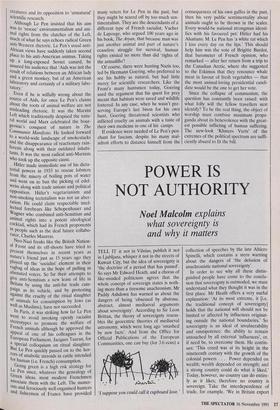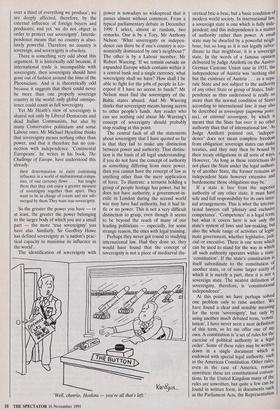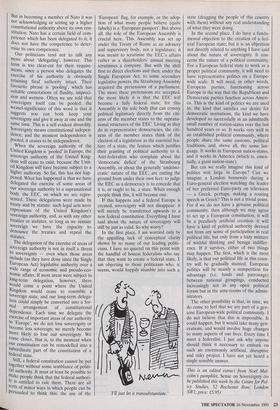POWER IS NOT AUTHORITY
Noel Malcolm explains
what sovereignty is and why it matters
TELL IT it not in Vilnius, publish it not in Ljubljana, whisper it not in the streets of Kuwait City, but the idea of sovereignty is 'the doctrine of a period that has passed'. So says Mr Edward Heath, and a chorus of like-minded politicians agrees that the whole concept of sovereign states is noth- ing more than a tiresome anachronism. Mr Paddy Ashdown has warned us about the dangers of being 'obsessed by abstruse, abstract, almost mediaeval arguments about sovereignty'. According to Sir Leon Brittan, the theory of sovereignty resem- bles the geocentric theories of mediaeval astronomy, which were long ago 'smashed by new facts'. And from the Office for Official Publications of the European Communities, one can buy (for 3.6 ecus) a
'I suppose you could call it cupboard love.'
collection of speeches by the late Altiero Spinelli, which contains a stern warning about the dangers of 'the delusion of anachronistic national sovereignty'.
In order to see why all these distin- guished people have come to the conclu- sion that sovereignty is outmoded, we must understand what they thought it was in the first place. Mr Heath offers a very useful explanation: 'At its most extreme, it [i.e. the traditional concept of sovereignty] holds that the national will should not be limited or affected by influences originat- ing outside the national boundaries.' So sovereignty is an ideal of invulnerability and omnipotence: the ability to remain untouched by all external 'influences', or, if need be, to overcome them. He contin- ues: 'This creed was at its height in the nineteenth century with the growth of the colonial powers . . . Power depended on wealth; wealth depended on strength; and a strong country could do what it liked.' Today, however, no country can do entire- ly as it likes; therefore no country is sovereign. Take the interdependence of trade, for example. 'We in Britain export over a third of everything we produce': we are deeply affected, therefore, by the external influence of foreign buyers and producers; and yet 'we do not object in order to protect our sovereignty'. Interde- pendence means that no country is abso- lutely powerful. Therefore no country is sovereign, and sovereignty is obsolete.
There is something very odd about this argument. It is historically odd because, if international trade is incompatible with sovereignty, then sovereignty should have gone out of fashion around the time of the Phoenicians. And it is theoretically odd because it suggests that there could never be more than one properly sovereign country in the world: only global omnipo- tence could count as full sovereignty.
Yet Mr Heath's view of sovereignty is shared not only by Liberal Democrats and dead Italian Communists, but also by many Conservative politicians and some Labour ones. Mr Michael Heseltine thinks that sovereignty means nothing other than power, and that it therefore has no con- nection with independence. 'Continental Europeans', he writes in his book, The Challenge of Europe, have understood this already:
their determination to exert continuing influence in a world of multinational compa- nies, of vast currency flows . . . has taught them that they can enjoy a greater measure of sovereignty together than apart. They want to be in charge of events and not sub- merged by them.They want true sovereignty.
So the greater the power you have — or at least, the greater the power belonging to the larger body of which you are a small part — the more 'true sovereignty' you have also. Similarly, Sir Geoffrey Howe has defined sovereignty as 'a nation's prac- tical capacity to maximise its influence in the world'.
The identification of sovereignty with power is nowadays so widespread that it passes almost without comment. From a typical parliamentary debate in December 1990 I select, almost at random, two remarks. One is by a Tory, Mr Anthony Nelson: 'What sovereignty or indepen- dence can there be if one's country is eco- nomically dominated by one's neighbour?' The other is by a Labour member, Mr Robert Wareing: 'If we remain outside an expanded Europe which contains within it a central bank and a single currency, what sovereignty shall we have? How shall I be able to fight for the jobs of people in Liv- erpool if I have no access to funds?' Mr Nelson must find the sovereignty of the Baltic states absurd. And Mr Wareing thinks that sovereignty means having access to other people's funds. Any reader who can see nothing odd about Mr Wareing's concept of sovereignty should probably stop reading at this point.
The central fault of all the statements about sovereignty that I have quoted so far is that they fail to make any distinction between power and authority. That distinc- tion is the basis of all legal understanding: if you do not have the concept of authority as something differing from mere power, then you cannot have the concept of law as anything other than the mere application of force. To illustrate: a terrorist holding a group of people hostage has power, but he does not have authority; a government-in- exile in London during the second world war may have had authority, but it had lit- tle or no power. This is not a very difficult distinction to grasp, even though it seems to be beyond the reach of many of our leading politicians — especially, for some strange reason, the ones with legal training.
Perhaps they never got round to studying international law. Had they done so, they would have found that the concept of sovereignty is not a piece of mediaeval the- oretical bric-a-brac, but a basic condition of modern world society. In international law, a sovereign state is one which is fully inde- pendent; and this independence is a matter of authority rather than power. A small state may be dwarfed by a powerful neigh- bour, but so long as it is not legally subor- dinate to that neighbour, it is a sovereign state. In the words of a famous opinion delivered by Judge Anzilotti on the Austria- German Customs Union case in 1931, the independence of Austria was 'nothing else but the existence of Austria. . . as a sepa- rate State and not subject to the authority of any other State or group of States. Inde- pendence as thus understood is really no more than the normal condition of States according to international law; it may also be described as sovereignty (supremo potes- tas), or external sovereignty, by which is meant that the State has over it no other authority than that of international law.' As Judge Anzilotti pointed out, 'indepen- dence' does not mean complete freedoin from obligation: sovereign states can make treaties, and they may then be bound hY their treaty obligations in all sorts of ways. However, 'As long as these restrictions do not place the State under the legal authori- ty of another State, the former remains an independent State however extensive and burdensome those obligations may be.' If a state is free from the superior authority of any other state, it must have sole and full responsibility for its own inter- nal arrangements. This is what the interna- tional lawyers call 'plenary and exclusive competence'. 'Competence' is a legal term; but what it covers here is not only the state's system of laws and law-making, but also the whole range of activities of legiti- mate government, whether legislative, judi- cial or executive. There is one term which can be used to stand for the way in which all such authority operates within a state: 'constitution'. If the state's constitution is itself subordinate to the constitution of another state, or of some larger entity of which it is merely a part, then it is not a sovereign state. The neatest definition of sovereignty, therefore, is 'constitutional independence'. At this point we have perhaps solved one problem only to raise another. We have found a clear and sensible meaning for the term 'sovereignty', but only bY using another much debated term, 'consti- tution'. I have never seen a neat definition of this term, so let me offer one of MY own. A constitution is 'a set of rules for the exercise of political authority in a legal order'. Some of these rules may be written down in a single document which is endowed with special legal authority, such• as the American Constitution. Other rules, even in the case of America, remain unwritten: these are constitutional conven- tions. In the United Kingdom many of the rules are unwritten, but quite a few can be found in written form, in documents such as the Parliament Acts, the Representation
of the People Act, the Royal Assent Act and so on. It is sometimes claimed that the United Kingdom does not have a constitu- tion; but this is just a misleading piece of shorthand, meaning that the United King- dom does not have a single privileged doc- ument. All states have constitutions.
Many of the basic rules of a constitution will be strictly stated in laws, and a compli- cated system of legal provisions will cover most activities of government. Anything done in accordance with the laws has legal authority. But legal authority on its own is not enough: the whole system of govern- ment, including the system of laws, has to be validated by a less formal but more fun- damental kind of authority — political authority. Without political authority, a structure of rules and legal order is a for- mal skeleton with no life in it. After a pop- ular revolution, for example, one may be able to point to the laws of the land and the rules of succession to demonstrate that the heir to the executed king is now the rightful monarch. But if the new rulers enjoy real political authority and the heir to the old king lacks it, those new rulers will be able to remodel the constitution: no legal objections deriving from the old order will prevail against them.
And where does political authority come from? The basis of political authority is that it is recognised, or granted, or willed, or believed in, by the people who are sub- ject to it, the members of the political community. What matters is that the peo- ple should accept that the government is entitled to rule them; their reason for accepting this may be that they are able to express their will in elections, or it may be that they think the government has divine right, or it may be one of many other rea- sons. If they do accept it, then the govern- ment has political authority. This is why some theorists talk about 'the sovereignty of the people' and argue that it is the true or ultimate sovereignty. But who or what is a people? Are the people of Bavaria sovereign, for instance? Not really (or not any more; or not yet). In order to know which people are relevant to such an argu- ment, we have to know what the appropri- ate political structure is — i.e., in this case, not Bavaria but Germany. Political authority is certainly the basis or necessary condition of sovereignty; but only when it is embodied, so to speak, in a legal order and operating according to rules does a state have a constitution, and only when that constitution is independent can the state be described as sovereign. Being constitutionally independent does not mean living like a recluse, refusing all forms of interaction with other states. Sovereignty itself cannot be delegated, but the exercise of a state's sovereign authority in many areas can be, either to another state or to an international body. The United Kingdom has delegated a very important part of the exercise of its sovereign authority, for example, to Nato. But in becoming a member of Nato it was not acknowledging or setting up a higher constitutional authority above its own con- stitution. Nato has a certain field of com- petence which has been delegated to it; it does not have the competence to deter- mine its own competence.
Our politicians tend not to talk any more about 'delegating', however. This term is too clear-cut for their require- ments, since a person who delegates the exercise of his authority is obviously retaining final authority intact. Their favourite phrase is 'pooling', which has suitable connotations of fluidity, impreci- sion and wetness. Often we are told that sovereignty itself can be pooled: the weasel-significance of this word is that it suggests you can both keep your sovereignty and give it away at one and the same time. This is a self-evident absurdity. Sovereignty means constitutional indepen- dence; and the moment independence is Pooled, it ceases to be independence. When the sovereign authority of the United Kingdom is 'pooled' in Europe, the sovereign authority of the United King- dom will cease to exist, because the Unit- ed Kingdom will have become subject to a higher authority. So far, this has not hap- pened. What has happened is that we have delegated the exercise of some areas of our sovereign authority to a supranational body, the EEC, on which we are repre- sented. These delegations were made by treaty and by statute: such legal acts were expressions of the United Kingdom's sovereign authority, and, as with any other treaties or statutes, so long as we remain sovereign we have the capacity to denounce the treaties and repeal the statutes.
The delegation of the exercise of areas of sovereign authority is not in itself a threat to sovereignty — even when those areas include (as they have done since the Single European Act) legislative authority over a Wide range of economic and pseudo-eco- nomic affairs. If most areas were subject to long-term delegation, however, there would come a point where the United Kingdom would cease to resemble a sovereign state, and our long-term delega- tion could simply be converted into a for- mal arrangement of constitutional dependence. Each time we delegate the exercise of important areas of our authority to 'Europe', we do not lose sovereignty or become less sovereign; we merely become more likely to lose our sovereignty. We come closer, that is, to the moment when our constitution can be remodelled into a subordinate part of the constitution of a federal state.
Still, a federal constitution cannot be put together without some semblance of politi- cal authority. It must at least be possible to make people think that the federal authori- ty is entitled to rule them. There are all sorts of minor ways in which people can be persuaded to think this: the use of the 'European' flag, for example, or the adop- tion of what many people believe (quite falsely) is a 'European passport'. But above all, the role of the European Assembly is crucial here. This Assembly was set up under the Treaty of Rome as an advisory and supervisory body, not a legislature; it was meant to scrutinise the EEC's affairs rather as a shareholders' annual meeting scrutinises a company. But with the shift first to direct elections and then, under the Single European Act, to some secondary legislative powers, the Strasbourg Assembly acquired the pretensions of a parliament. The more these pretensions are accepted, the more likely it is that the EEC will become a fully federal state; for this Assembly is the sole body that can convey political legitimacy directly from the citi- zens of the member states to the suprana- tional structures of the EEC. Living as they do in representative democracies, the citi- zens of the member states think of the election of a legislature as the essential fea- ture of a state, the feature which justifies their granting of political authority to it. Anti-federalists who complain about the 'democratic deficit' of the Strasbourg Assembly, or about the generally 'undemo- cratic' nature of the EEC, are cutting the ground from under their own feet: to judge the EEC as a democracy is to concede that it is, or ought to be, a state. When enough people think this, it will become one.
If this happens and a federal Europe is created, sovereignty will not disappear: it will merely be transferred upwards to a new federal constitution. Everything I have said about the nature of sovereignty will still be just as valid. So why worry?
In the first place, I am worried only by the appalling lack of conceptual clarity shown by so many of our leading politi- cians. I have no quarrel on this point with the handful of honest federalists who say that they want to create a federal state. I am objecting to those politicians who, it seems, would happily stumble into such a
just let it transubstantiate.'
state (dragging the people of this country with them) without any real understanding of what they were doing.
In the second place, I do have a funda- mental objection to the creation of a fed- eral European state; but it is an objection not directly related to anything I have said about the nature of sovereignty. It con- cerns the nature of a political community. For a European federal state to work as a proper political community, it will need to have representative politics on a Europe- wide scale. It will need, in other words, European parties, functioning across Europe in the way that the Republican and Democratic parties function across Ameri- ca. This is the kind of politics we are used to, the kind that satisfies our desire for democratic institutions, the kind we have developed so successfully in an admittedly small number of nation-states over the last hundred years or so. It works very well in an established political community, where people share the same customs, political traditions, and, above all, the same lan- guage. It works in European nation-states, and it works in America (which is, essen- tially, a giant nation-state).
But can we really imagine this kind of politics writ large in Europe? Can we imagine a London housewife during a Euro-general election watching the leader of her preferred Euro-party on television — a Greek, perhaps, making a rousing speech in Greek? This is not a trivial point. For if we do not have a genuine political community, then although we may agree to set up a European constitution, it will be a peculiarly artificial creation: it will have a kind of political authority derived not from any sense of participation in real political life, but only from a hazy mixture of wishful thinking and benign indiffer- ence. If it survives, either of two things may happen. The first, which is the most likely, is that our political life in this coun- try will be gradually stunted. European politics will be mainly a competition for advantage (i.e. funds and patronage) between national groupings, conducted increasingly not in any open political forum but in the ante-rooms of the admin- istrators.
The other possibility is that, in time, we do come to feel that we are part of a gen- uine European-wide political community. I do not believe that this is impossible. It could happen, but it would take many gen- erations, and would involve huge changes to many aspects of our lives. Every time I meet a federalist, I just ask why anyone should think it necessary to embark on such an enormously artificial, disruptive and risky project. I have not yet heard a single sensible answer.
This is an edited extract from Noel Mal- colm's pamphlet, Sense on Sovereignty (to he published this week by the Centre for Pol- icy Studies, 52 Rochester Row, London SWI; price: £5.95)













































































 Previous page
Previous page